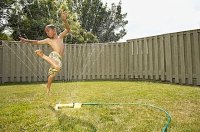Seven Ways to Prevent Summer Learning Loss
Summer is upon us once again, and parents are beginning to plan for their children's days without a school schedule. Dreams of days filled with family, friends, freedom and laughter are in students' heads as they say goodbye to another school year. However, a nonacademic summer can cause students at every grade level to digress two to three months in their academic skills. Half an hour to an hour set aside daily can help students close learning gaps and perform at higher levels during the upcoming school year. Summer is an ideal time for students of all ages to strengthen their academic skills while still having plenty of time left over for summer activities.
1. Make Time for Learning
Set aside time for your student to read each day during the summer break -- 15 to 30 minutes per day is all it takes! During the summer, students have more time to read for enjoyment, which also offers a great opportunity to preserve and strengthen their reading skills. Your summer activities should include taking your children or teenagers to the public library to check out books of interest and/or any summer reading groups they'd like to join.
A great way to track how much reading your child is doing during the summer months is a tally on your regular activities calendar. This will help keep the daily reading time from being overlooked because of other summer activities -- and we know there are many!
Parents of students reading below grade level should read with their children in order to assist with sounding out words they might not be able to decode themselves. In addition, keep a dictionary or online source close by to help students figure out those words by using the phonetic spelling provided.
2. Learn and Practice Affixes
Children and teens of all grade levels can improve their reading and spelling skills by learning affixes. Most multi-syllable words include prefixes and suffixes added to a base word. You can find a list of affixes and their meanings in a dictionary or in many online sources. To make this practice appealing, turn it into a game! Students can create flashcards of prefixes and suffixes. On the reverse side of each affix flash card, they should write the meaning. All children love guessing games and can point out what they think the affix means. You can also use this game to help them learn new vocabulary words.
3. Develop Math Skills
Though it may not seem fun to them at the time, working on just three to four math problems per day during the summer can prevent students' mathematical skills from getting rusty. They can look at it as a daily challenge that they must complete, or a daily "to-do" to proudly check off their calendar. Parents can purchase a math workbook for their child's academic level at most bookstores. Working on just a few problems daily (or more, if your child enjoys math) can help students of all ages close the gaps in their math skills, preserve what they learned during the previous school year, and prepare for the next.
4. Improve Reading Comprehension
To help your children better understand what they're reading, consider offering them a reading comprehension workbook to work on several minutes daily. These can be found at teacher supply stores or many online outlets. Students of all grades and ability levels can benefit scholastically by working with material that offers self-quizzes and high-interest stories. This practice helps develop their fact-retaining and inference-making skills.
5. Review and Build Grammar Skills
Review the past grade level's grammar concepts, and begin to work on the next school year's concepts. During the summer, students benefit from weekly reviews or pre-learning two to four lessons. Find workbooks geared to their grade or skill level, and encourage them to check their work using the answer key provided. Even if they make mistakes on their answers (and who doesn't make mistakes?), finally filling in the correct answers will reinforce their grammar skills.
6. Encourage Creative Writing
Creative writing is a great way to improve your children's written language skills while giving them a fun and imaginative activity during the summer! Have your student write a creative paragraph each week. As a parent, you can help by assisting him or her with choosing a "topic" (such as a family vacation, special outing or holiday memory) to write a paragraph about. Students can also benefit from using a thesaurus and changing several common words to more interesting words. This will make their writing more interesting while learning great new words at the same time.
7. Focus on Specific Skills
Pinpoint the subjects your child had the most trouble learning the previous school year, and make sure to fit in some practice in these areas. Summer is an ideal time to set aside just 15 to 30 minutes a day for helping your student on areas of difficulty. Again, use every resource available to you! Parents are not helpless when it comes to their child's education. Online resources and teacher supply stores offer a wide variety of learning materials, workbooks, computer games, and other types of games to reinforce and strengthen scholastic skills. Students may wish to play learning games with their friends to help make the time fly by and make learning more fun.
Over the summer, students and parents who practice the above tips can see great strengthening and improvement in scholastic skills, and avoid digressing two to three months in learning. Summer learning can be fun and challenging at the same time. Students may find learning to be more fun as they become more capable of meeting scholastic challenges and overcoming any learning weaknesses. By implementing a summer plan and igniting your child's passion for learning, he or she can enjoy a renewed sense of academic self-esteem and dignity -- wonderful benefits of learning not to be "counted out."
